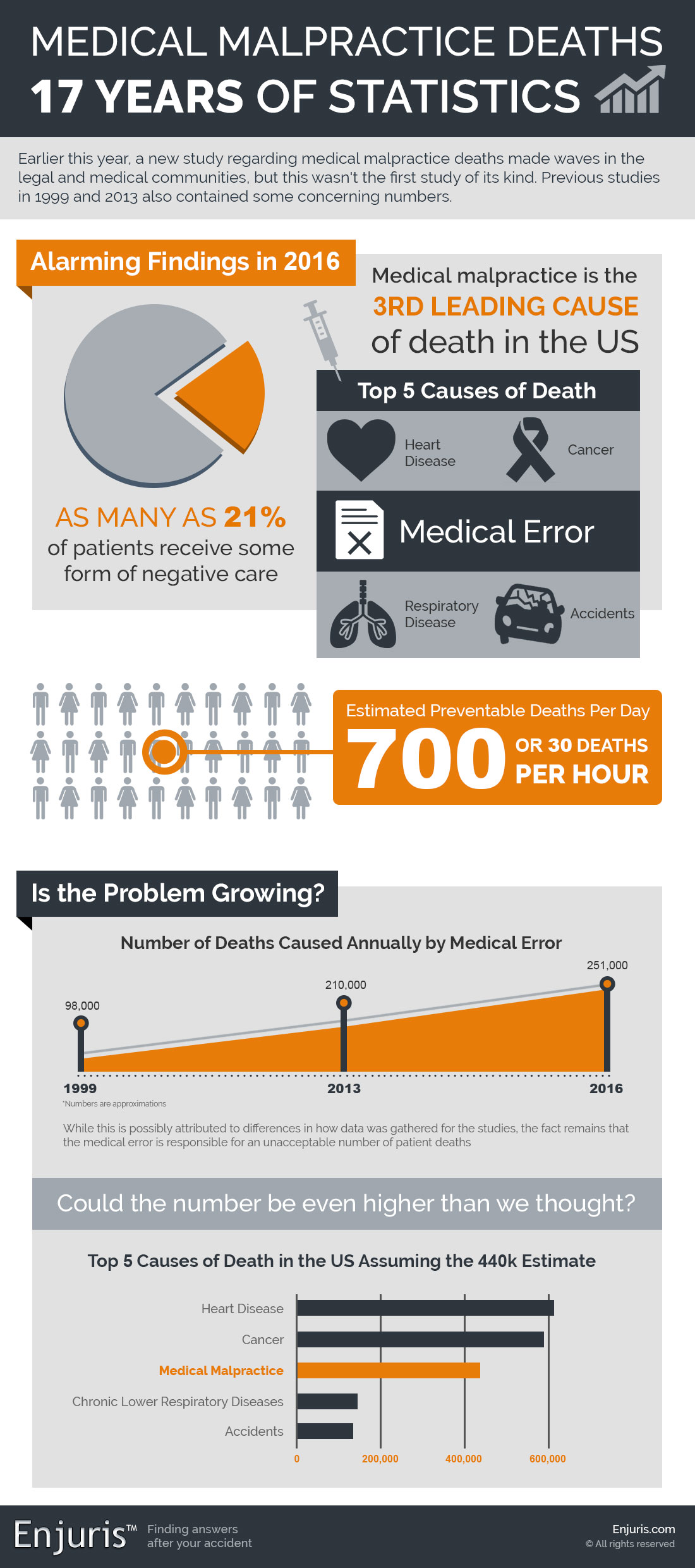Injured by a healthcare professional?
Here's what you need to know if you're considering a medical malpractice claim
The United States has some of the highest standards in medical treatment.
Millions of people throughout the country receive medical treatment without any incident, but that doesn't stop thousands of people being injured or dying every year while visiting a healthcare professional.
Thousands of Americans suffer from medical malpractice injuries annually, but fewer than 15% of personal injury cases filed each year involve medical malpractice.
If you think medical malpractice might have happened to you, it's critical to learn about your legal rights so that your attorney can help you to obtain appropriate compensation.
Tweet this
Common types of medical malpractice cases
If your medical professional committed one of the acts below while you were in their care, you could have legal options:
- Failed to diagnose your condition or gave a wrong diagnosis
- Misread or disregarded important lab results
- Conducted an unnecessary surgery
- Made a surgical error or performed on the wrong surgery site
- Gave improper medication or dosage
- Gave poor follow-up care
- Discharged you prematurely
If you believe that you may have a medical malpractice case, you and your medical malpractice attorney must prove negligence on the part of the health care provider.
Medical malpractice and negligence
A claim for medical malpractice arises when a patient is harmed by a medical professional who fails to perform medical duties according to the appropriate standard of care. In order for a victim to recover compensation for the injuries that he has suffered because of medical malpractice, the plaintiff has the burden of establishing certain legal elements. These must be proven by a preponderance of the evidence, meaning that the evidence weighs more in favor of the plaintiff than the defendant, or to put it simply, "more likely than not."
To give you some context, a criminal trial requires that a defendant be proven guilty "beyond a reasonable doubt."
As in any personal injury case, negligence must be proven in court for the victim to receive compensation.
The four elements of negligence that must be proven here are below:
For this example, let's assume that you have taken your daughter to the doctor with a deep cut on her arm, and the doctor accidentally used contaminated tools to stitch the wound. Her arm then becomes infected and she requires emergency medical care.
- Duty: Once the doctor/patient relationship is established, the health care provider owes a duty of care. This duty requires her to act as any other doctor would act in the same situation. She is required to follow standard medical guidelines that are widely accepted in the medical field. In this instance, you took your daughter to the doctor, submitted personal information in the office and had a medical exam conducted on your daughter's wounded arm. This situation established that the doctor had a duty of care and must act as any other physician would in the same situation.
- Injury: You must suffer an injury because of the actions of the physician. In this case, your daughter got an infection from the dirty tools that were used to stitch the wound. To win a medical malpractice suit, your lawyer must prove that these dirty tools directly caused the infection.
- Damages: Your lawyer has to prove that the patient (in this case, your daughter) suffered economic or non-economic damages from the injury. In our example, perhaps your daughter had further medical bills that would have been unnecessary without the infection. You had further costs from missing work to take her to her appointments, as well as travel costs. If there was substantial scarring, perhaps she had non–economic damages, as well.
- Breach: After a duty of care is established, your physician must exercise reasonable care and treat the patient as any other doctor would. He has to follow common procedures and actions. In this example, the duty was breached when your doctor violated standard protocol by using contaminated tools to stitch your daughter's wound, rather than sanitized tools.
For the medical professional to be found negligent, your attorney must show that her conduct fell below the "accepted standard" of medical care. To establish that accepted standard in court, usually you must have an expert medical witness testify about the standard of care that was violated in your case.
Starting a medical malpractice case
Most health care providers try to provide a high standard of care, but bad things do happen. If you had a medical experience that harmed you, you could be entitled to compensation in a medical malpractice lawsuit. The basic steps to follow to file such a case are:
- Determine the statute of limitations for filing a medical malpractice lawsuit in your state. For instance, Colorado's statute of limitations is two years from the injury date and no more than three years from the act.
- Prior to filing a lawsuit, you should contact your health care provider to determine what may have gone wrong. Allow the physician or health care provider an opportunity to address the problem.
- If talking to the doctor does not resolve the situation, you may contact the state medical board to file a complaint.
- Determine if your state requires you to obtain a "certificate of merit" from a medical expert for a malpractice lawsuit to proceed through the legal system. There are 28 states that have such a requirement for a certificate of merit. Conversely, 32 states and Guam have laws about minimum standards for expert medical witnesses who testify in a medical malpractice lawsuit.
- Consider settling out of court. These cases are complex and expensive, which is why the vast majority of medical malpractice cases are settled before trial.
As you can guess, coordinating a medical malpractice lawsuit is difficult and very stressful. The process can take a long time.
Tweet this
An experienced medical malpractice attorney is extremely beneficial; she can quickly gauge if you have a strong malpractice case, and can help you to get a fair settlement or proceed with a lawsuit.
Medical malpractice damages
Damages that you could be entitled to in a medical malpractice lawsuit are:
- General damages: loss of enjoyment; physical and mental pain/suffering; loss of future wages
- Special damages: medical bills and lost wages in the past.
- Punitive damages: damages designed to punish the health care provider for reckless and truly negligent acts. Some states have caps in place that limit punitive damage awards.
Who to sue in medical malpractice cases
Medical malpractice legal actions are not limited to doctors. Other health care professionals and entities can be sued as well, such as:
- Nurses
- Anesthesiologists
- Health care facilities and hospitals
- Pharmaceutical and medical device companies
Hospital negligence
Virtually all hospitals are corporations, and they can be held liable for negligence. Also, they may be held vicariously liable for their employees' negligence. The medical staff at a hospital has doctors, nurses, physician's assistants, nurse practitioners and many others.
When the hospital hires, it must ensure that all applicants have appropriate education, licensing and training. If they fail to do so, the hospital may be held liable under different theories, such as respondeat superior (such as the hospital being responsible for a nurse's misconduct) and the corporate negligence doctrine (such as the hospital being responsible for a private physician's misconduct).
Hospitals also must have enough RNs working on every shift so that quality care can be provided to patients.
If the hospital does not do so, it can be sued for patient injuries because of a shortage of nurses.
Another common liability area is when employees fail to follow the orders of the doctor for a patient. On the other hand, if the employee clearly knows that the superior's orders are contraindicated and follows them anyway despite knowing better, that could also lead to liability.
What is the cap on malpractice?
Many states have implemented damage caps regarding medical malpractice cases. The states that have these laws are often concerned with the increasing cost of insurance and place a ceiling on the amount of damages that a victim can recover.
Sometimes the cap only applies to non-economic damages such as pain and suffering and mental distress while not applying to economic damages that can be easier to calculate based on objective evidence, such as medical expenses and lost wages.
Additional requirements for some states
Some states have specific requirements regarding medical malpractice claims that differ from pursuing other personal injury cases.
For example, the victim may be required to submit a claim to a panel that determines if the case gives rise to a medical malpractice claim. The court may dismiss the case if the panel finds that no such claim has arisen. Other states first require a certificate from a medical expert that establishes the basis of the claim.
What’s the statute of limitations for malpractice?
Medical malpractice cases often have a very tight statute of limitations that serves as a timeline for when a case can be filed. If the lawsuit is not brought before this time, the claim can be barred and the victim can be prohibited from recovering.
In many states, this time limit is three years. Some states have even shorter timelines.
A major point of contention in different states is when this time limit starts to tick with some states starting on the date of the incident while in other states the time limit starts when the error was discovered.
Expenses of medical malpractice lawsuits
Medical malpractice cases are some of the most expensive types of cases to litigate. This is because it is often very expensive to hire medical experts and conduct investigation into these cases. Additionally, discovery can be exhaustive and may require additional payment of expenses.
Many personal injury lawyers take medical malpractice cases based on a contingency fee in which he does not charge attorney fees upfront and only receives payment if the claim results in a settlement or verdict.
However, it is important that individuals have a firm understanding of how expenses like discovery expenses, court costs and expert fees will be allocated. Generally the agreement is "contingency plus fees," in which fees are paid back out of the settlement and then it is distributed among the parties.
More information on medical malpractice cases
How to find the best medical malpractice attorney for your case
It is important to do plenty of research and choose a medical malpractice lawyer with many years of experience in medical negligence legal work.
Medical malpractice law is a very specialized area that requires an attorney with a lot of experience. This is because there is plenty of overlap between complicated medical and legal matters. There also are unique procedural matters that come up in medical malpractice cases.
Most attorneys in medical malpractice law practice one of two kinds:
- They defend doctors from medical malpractice suits, or
- They represent patients who have been injured
Read more and see where to find a lawyer in How to Find the Right Medical Malpractice Attorney for Your Case.

Medical Malpractice Deaths
17 Years of Statistics
View Full Size Get the Code Use this graphic on your site
Use this infographic on your site
We encourage people to use our infographics, with proper attribution. Just copy and paste the code below to use this infographic on your site. If you need help, let us know!
<a href="https://www.enjuris.com/medical-malpractice/" target="blank"><img src="https://www.enjuris.com/infographics/medical-malpractice-death-statistics.jpg" alt="Medical Malpractice Deaths - 17 Years of Statistics" title="Medical Malpractice Deaths - 17 Years of Statistics" style="width: 100%; max-width: 1100px; display: block; margin: 15px auto;" /></a>
Did you know that medical malpractice law varies by state?
- Botched Plastic Surgery: Is Your Doctor Liable for Malpractice?
- Can You File a Medical Malpractice Lawsuit Against a Med Spa?
- Can You Sue the Hospital for Your Healthcare-Acquired Infection?
- Contraindicated Medication Lawsuits
- Dental Malpractice: What to Do if You’ve Suffered a Dental Injury
- Guide to Cerebral Palsy and Birth Injury Law
- Guide to Veterinary Malpractice Claims & Wrongful Pet Death Lawsuits
- How Much Does a Doctor’s Board Certification Matter?
- Informed Consent Doesn’t Preclude a Medical Malpractice Lawsuit
- Medical Malpractice vs. HMO Malpractice Lawsuits
- Patient Abandonment: Navigating Legal Rights and Remedies for Neglected Patients
- Suing a Healthcare Professional for Misdiagnosis or Failure to Diagnose
- What to Do if You Suspect Medical Malpractice
- How to Find the Best Medical Malpractice Attorney for Your Case
- 5 of the Most Common Types of Birth Injury
- Knee Replacement Lawsuits
- Spinal Fusion Lawsuits
- Medical Malpractice FAQ
- When Can a Patient Sue a Hospital for Negligence
- Medical Malpractice and Physicians/Nurses
- Medical Malpractice and Wrongful Death
- Emergency Room Malpractice/Surgical Errors
- Failure to Diagnose Cancer
- Medical Malpractice and Medication Errors
Free resources to help you hire the best med mal lawyer
Selecting the right attorney can often make or break a medical malpractice case; these cases are intensely complicated, and doctors are always represented by tough, aggressive insurance companies and attorneys because they are generally on a hospital's payroll. Even if they're not, their insurance company will put together a terrifying legal team. Read more

















